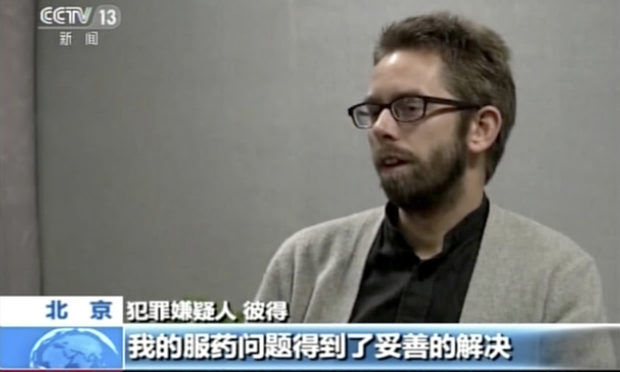Peter Dahlin, who worked with Chinese human rights lawyers, had been held on suspicion of endangering state security

Peter Dahlin appearing on China state television after he was taken into custody earlier this month. Photograph: AP
China has released a Swedish human rights activist it had taken into custody earlier this month and accused of being a foreign agent trying to undermine the Communist party, the Swedish foreign ministry has said.
Peter Dahlin, 35, is thought to have left the country on a flight from Beijing to Stockholm on Monday afternoon, a spokesperson for his human rights organisation, Chinese Urgent Action Working Group (CUAWG), told the Guardian.
Sweden’s foreign minister, Margot Wallström, said she had been informed by Chinese authorities that Dahlin had been released and she welcomed his release.
Dahlin’s Chinese girlfriend, Pan Jinling, is also understood to have been released from police custody, having disappeared at the beginning of January after Dahlin was seized by security officials in the Chinese capital.
Michael Caster, a spokesman for CUAWG, said he was grateful that his friend and colleague would be “back home safe in Sweden”.
“However, that he has been released shouldn’t obscure the fact that many members of the Chinese human rights community whom Peter sought to support remain in detention for nothing more than working to promote and protect the rights of all Chinese citizens.”
He added: “I hope that the international community will continue to raise their cases, as they did for Peter.”
The circumstances surrounding Dahlin’s unexpected release were not immediately clear.
His apparent deportation comes almost one week after he was paraded on Chinese television to make what friends and colleagues described as a forced confession. The activist, whose group had worked in China since 2009, was detained on suspicion of “endangering state security” as he tried to flee the country in early January.
Friends say Dahlin had decided to abandon his home in Beijing after becoming concerned that he would be detained as part of a government offensive against human rights lawyers that began last year.
Government-controlled media said he been held as part of a police operation that “smashed an illegal organisation that sponsored activities jeopardising China’s national security”.
Xinhua, China’s official news agency, claimed Dahlin had “hired and trained others to gather, fabricate and distort information about China”.
It also alleged that “western anti-China forces had planted Dahlin and some other people in China to gather negative information for anti-China purposes such as smear campaigns”.
Dahlin’s group is understood to have been working with at least one of the human rights lawyers at the centre of a major Communist party crackdown that began last July, in which scores of lawyers and their activists and relations have been detained, interrogated or harassed.
More than a dozen remain in custody facing subversion charges, including Wang Yu and Li Heping, two of China’s best-known civil rights lawyers.
Caster has claimed authorities coerced Dahlin into making his television “confession”, which sent shockwaves through Beijing-based non-governmental organisations.
On Monday, following Dahlin’s release, Caster said: “It is important to keep in mind that regardless of what Peter may have admitted to while in detention, his so-called confession was delivered under duress in effectively secret detention while being denied access to legal representation.
“Such practice is a travesty of due process and the rule of law and emblematic of precisely why it is imperative that lawyers in China be allowed to educate and defend citizens of their rights and not to be treated as criminals for doing so.”
Writing on the Asia Society’s ChinaFile website, the media expert David Bandurski said the increasing use of such confessions underlined the severity of the political chill that has engulfed China since Xi Jinping became leader in late 2012.
“The use of public confessions is highly indicative of the retrogressive nature of Chinese politics under Xi Jinping,” Bandurski wrote.
“Despite Xi’s overtures on clean governance and rule of law, such confessions are political tools of fear and shame that hearken back to the ‘letters of self-criticism’ that were part of the political terror gripping China up to the end of the Cultural Revolution.
Sweden’s foreign ministry said in the statement it remained concerned about a naturalised Swedish citizen, Gui Minhai, a Hong Kong-based bookseller who had vanished in October in Thailand.
He appeared on China state television earlier this month, saying he had surrendered to authorities over a fatal drink-driving offence more than a decade ago.
“I am greatly concerned over over the detained Swedish citizen Gui Minhai,” Wallström said, adding that Sweden was working to get clarity on his situation and the opportunity to visit him.
Source: http://www.theguardian.com/world/2016/jan/25/china-releases-swedish-human-rights-activist-peter-dahlin
